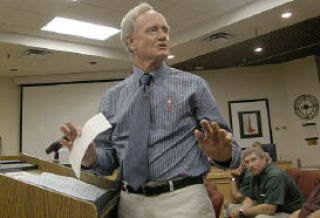Business owners upset with the lack of return on the money they are assessed each year to keep the Auburn Downtown Association going urged the Auburn City Council Monday to dissolve the Business Improvement Area rate-payers’ committee that underpins the ADA.
Crystal Hochhaus, owner of QC Graphics and Signs at 341 E. Main St. east of Auburn Way, said the ADA isn’t doing anything, particularly for businesses outside the central downtown area.
“Downtown is all boarded up,” said Hochhaus. “It’s really depressing, and it’s gotten worse since I’ve been here. We’re paying money that goes to something … that isn’t helping. The (ADA) events are drawing less and less people, and yet they want to keep doing it. It doesn’t make sense.”
ADA treasurer John Rottle said that merchants have legitimate grievances. In a letter read by his brother Jim Rottle, who was out of town, said that in the wake of director Debbie Luce’s departure to the Auburn Tourism Board in August 2007, the loss of key volunteers, and the loss of key businesses on the Cavanaugh block, the ADA has been adrift. It didn’t even submit a budget to City Hall for funds until July, months late, and the funds have not yet been disbursed to help anybody.
But Rottle noted that the ADA has allowed merchants a voice at City Hall, launched programs like the sidewalk sale, the farmer’s market during the ’90s, the downtown quarterly tabloid, the Supermall Mitigation Resolution and the street program.
“Without a unified effort, none of that would have happened,” Rottle said.
Call for a hearing
The four who spoke for dissolution and the nine who argued against it came to City Hall after unhappy merchants circulated a petition last month asking the City to hold a public hearing. Eighty-seven business people signed the petition.
Because the hearing was the result of a petition, Council members were not required to take action.
In 1988, based upon the petition of business owners and operators, the city established the BIA to help develop the central business district and facilitate merchant and business cooperation to improve trade. The 11-member BIA committee reviews and evaluates the BIA’s administration by the ADA. Members serve three-year terms and are owners or operators of businesses located in the BIA whose establishments are subject to assessments.
Today there are 200 businesses within the BIA, roughly bounded on the west by D Street Northwest between First Streets Northeast and Southeast, on the east by F Street Southeast between Second Street Southeast and Main, on the south by Cross Street, and on the north by 5th Street Northeast.
Every year the ADA submits a budget to the BIA petitioning for a share of the funds the city has collected.
Businesses are subject to an annual assessment of 15 cents per square foot. The city approves the rate of assessment for the BIA fund and approves an annual budget for use of the funds. The BIA board makes a recommendation to the City Council regarding the disbursement of the funds.
Two years ago the city tied the business license to the assessment.
The 1988 ordinance had five specific areas the money could be spent on – business retention and recruitment, marketing, special events and promotions, improving security and enhancing the aesthetic experience in downtown Auburn
Cheryl Créson, owner of Créson’s Barber Shop at 222 E. Main St. in the Scarff Arcade, said in her 13 years of business all she had ever seen for her money were banners above Main Street and a permit for a parking lot. But half of that lot is now stenciled “permit parking,” and her customers can’t always find a place to park.
Créson was incensed at the city’s decision to tie the business license to the assessment.
“When somebody tells you to ‘pay up or get out,’ I take it personally,” said the Auburn native, a 1976 Auburn High School graduate.
Hochhaus said the Auburn Area Chamber of Commerce, not the ADA, is the proper organization to promote downtown business. And its dues, she added, are voluntary.
Jan Cavanaugh, one of the founders of the BIA and ADA and half-owner of the former Cavanaugh Ace Hardware, said before the BIA was established, anything that happened happened because of the Rottles, the JC Penny Company, Cavanaugh Ace Hardware and Harvey Wagoner and The Hobby Shop.
“We were the core that said this is not fair that we should be paying for everything, and everybody else benefits,” Cavanaugh said.
Pat Cavanaugh apologized to members of the ADA and BIA. He said they probably didn’t get as much from the ADA as they should have, because he was president when his business started falling apart and he didn’t have the time to spend.
But Cavanaugh preferred to talk about the future.
“I think we need to talk about what can happen and where we are going and that this town has some new businesses that are not only doing well but are active and want to participate. Those that want to join and be participants will find that it just grows,” Cavanaugh said.
Responding to Hochhaus, Cavanaugh recalled that the Chamber used to be almost entirely funded by downtown merchants. But when the Chamber became more regional in cope, it could no longer give funds to the downtown businesses in the way it once did. He said the Chamber recommended the ADA be set up to fund activities on an equal basis.
“Let’s go forwards not backwards, and the BIA is a good funding mechanism to do that,” Cavanaugh concluded.


